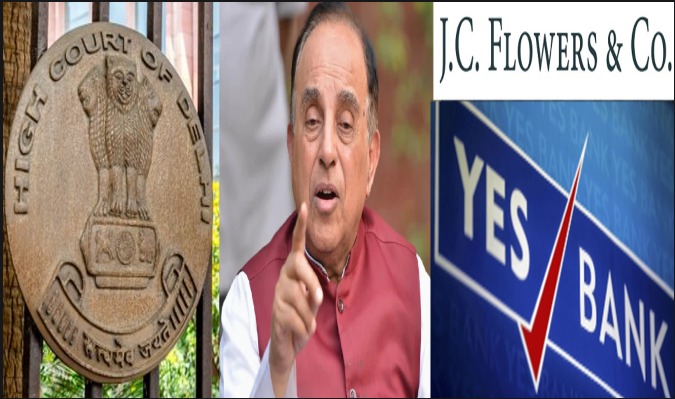
The Delhi High Court on Friday asked the Centre, the Reserve Bank of India (RBI), and the Securities and Exchange Board of India (SEBI) to respond to former Rajya Sabha MP Subramanian Swamy’s PIL seeking probe by an expert committee into the transfer of Yes Bank’s stressed assets to J.C. Flowers Asset Reconstruction Company.
A division bench of Chief Justice Satish Chandra Sharma and Justice Subramonium Prasad also sought responses from Yes Bank and the asset reconstruction company. Yet, no formal notice was issued in the matter today.
Swamy was represented by Senior Advocate Rajshekhar Rao and Advocate Satya Sabharwal.
The PIL further seeks directions on the Centre, RBI, and SEBI to develop “appropriate and comprehensive guidelines” in accordance with the suggestions of the experts committee to check similar agreements or transactions in the future.
The petition was moved in the backdrop of Yes Bank’s transfer of a stressed asset portfolio worth Rs. 48,000 crores to J.C. Flowers Asset Reconstruction Limited.
“This transfer is linked to another deal in which Respondent No.4 (Yes Bank) gained a share of up to 19.9% in the firm of Respondent No.5 (Asset Reconstruction Company),” the PIL stated.
Swamy claims in his petition that there is a “growing rot” in the private banking sector, which has been driven by the “perpetual decay” of corporate governance and ethical norms in the private banking and asset reconstruction industries.
“This is a rising source of concern since there appears to be a conflict of interest between the operations of banks and ARCs. The situation is further complicated when motivated and malafide transactions between the two are permitted to stand since the regulator (RBI) fails to act and implement its own norms, resulting in considerable loss of public funds,” the plea stated.
Swamy claims that Non-Performing Assets (NPAs) are an increasing issue for India’s private sector banks, and that poor credit risk management techniques and insufficient internal controls have contributed to the high levels of NPAs in private sector banks.
“The transfer of a distressed asset portfolio valued at Rs. 48,000 crores to Respondent No.5 (asset reconstruction firm) via these transactions appears to be a clear attempt to bypass rules and regulations in favour of Respondent No.5. This not only affects public faith in the financial industry, but also jeopardises the country’s economic stability. It is disturbing to observe how Respondent No.4 (Yes Bank) is ready to sacrifice the recovery of public funds for the benefit of a single enterprise,” the PIL added.




